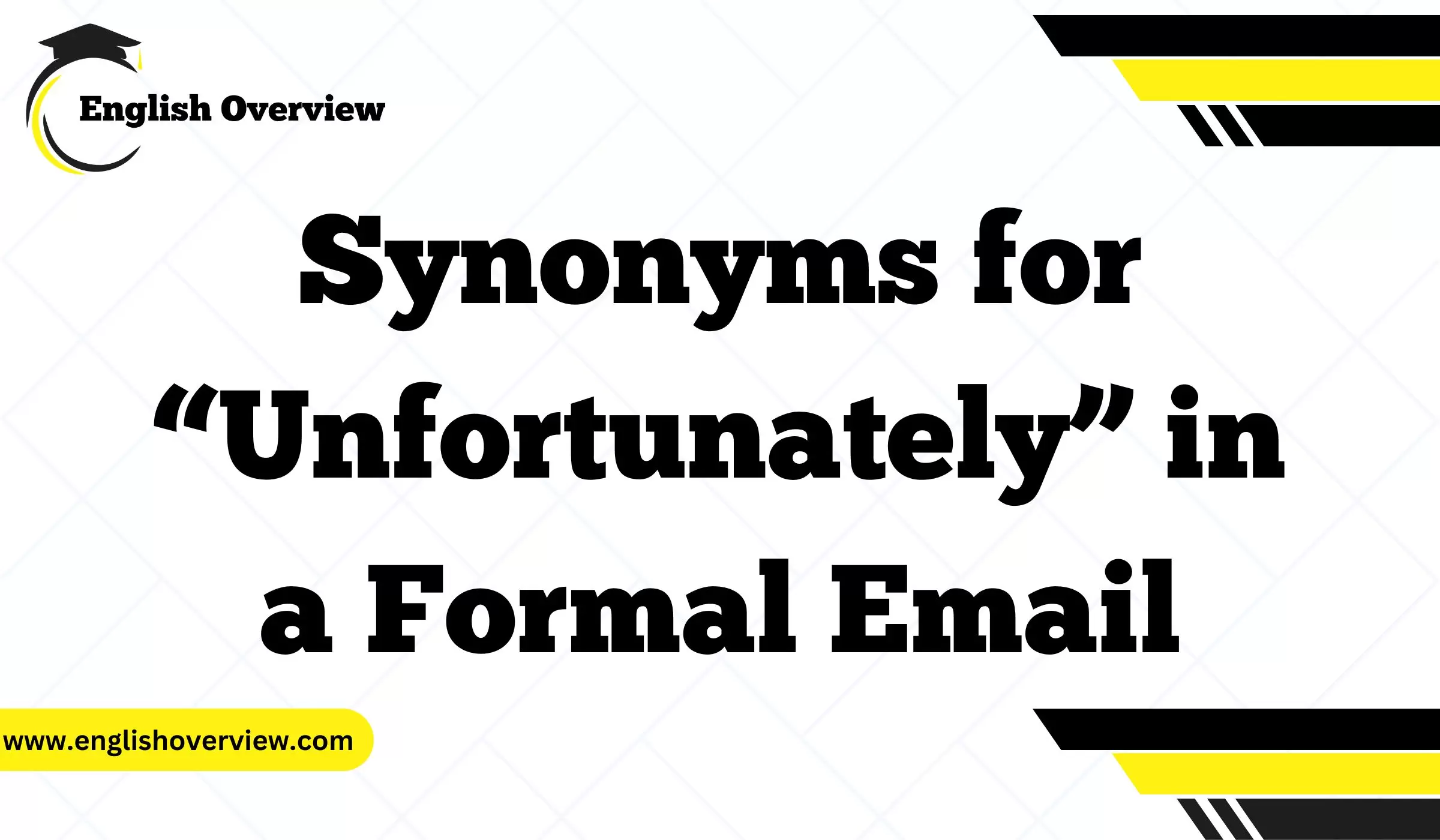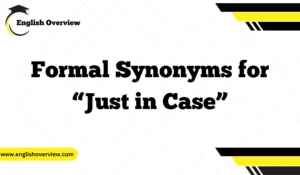In the realm of professional communication, mastering the art of conveying unfortunate news with finesse is paramount. The word “unfortunately” serves as a stalwart in such situations, but in the quest for elegance and variety in language, it’s beneficial to expand one’s lexicon.
In this article, we will explore 20 synonyms for “unfortunately” that can lend sophistication and nuance to your formal emails. Each synonym will be accompanied by scenario examples to illustrate its appropriate usage.
List of Synonyms for “Unfortunately” in a Formal Email
- Alas
- Sadly
- Regrettably
- Unhappily
- Lamentably
- Disappointingly
- Inauspiciously
- Woefully
- Unfortunately
- Deplorably
- Miserably
- Distressingly
- Unluckily
- Unfavorably
- Sorrowfully
- Grievously
- Dishearteningly
- Forlornly
- Unsuccessfully
- Dismally
Alas
In the realm of formal communication, the term “alas” carries a tone of regret and sorrow, often used to express disappointment or lamentation.
Scenario Example: Dear Royal,
Alas, despite our best efforts, the project deadline has been extended due to unforeseen circumstances beyond our control. We apologize for any inconvenience this may cause and appreciate your understanding.
Sincerely, Oscar
Sadly

“Sadly” conveys a sense of sorrow or regret, making it suitable for delivering unwelcome news in a formal setting.
Scenario Example: Dear Royal,
Sadly, the budget allocation for the upcoming fiscal year has been reduced, impacting our ability to proceed with planned initiatives. We are exploring alternative strategies to mitigate the effects of this decision.
Respectfully, Oscar
Woefully
With a touch of despondency, “woefully” communicates disappointment or distress in a formal context.
Scenario Example: Dear Royal,
Woefully, I must inform you that the proposed merger negotiations have fallen through. We are reassessing our options and will keep you updated on any developments.
Best regards, Oscar
Dishearteningly

“Dishearteningly” encapsulates a sense of discouragement or disillusionment, often used to convey unfortunate developments.
Scenario Example: Dear Royal,
Dishearteningly, the anticipated increase in market demand has not materialized as expected. We are revising our marketing strategies to adapt to these challenging circumstances.
Warm regards, Oscar
Inauspiciously
This term suggests an unfavorable or ominous turn of events, suitable for conveying disappointing news in a formal context.
Scenario Example: Dear Royal,
Inauspiciously, the quarterly financial report indicates a decline in revenue despite our concerted efforts to boost sales. We are exploring measures to reverse this trend.
Yours sincerely, Oscar
Distressingly

With a touch of urgency or concern, “distressingly” conveys the gravity of an unfortunate situation in a formal email.
Scenario Example: Dear Royal,
Distressingly, the recent data breach has compromised sensitive information, necessitating immediate action to address security vulnerabilities. We are implementing enhanced protocols to prevent future incidents.
Kind regards, Oscar
Deplorably
“Deplorably” evokes a sense of condemnation or disapproval, making it suitable for communicating regrettable circumstances in a formal tone.
Scenario Example: Dear Royal,
Deplorably, I must inform you that the shipment of essential supplies has been delayed due to logistical challenges. We are working diligently to expedite delivery and minimize disruptions to operations.
Yours faithfully, Oscar
Grievously
With a tone of solemnity or seriousness, “grievously” communicates the severity of an unfortunate situation in a formal context.
Scenario Example: Dear Royal,
Grievously, the recent restructuring has resulted in layoffs within our organization. We understand the impact this may have and are committed to supporting affected employees during this transition period.
Warm regards, Oscar
Forlornly
This term conveys a sense of desolation or abandonment, suitable for expressing disappointment or regret in a formal email.
Scenario Example: Dear Royal,
Forlornly, I must inform you that the proposed partnership agreement has been terminated due to irreconcilable differences. We remain open to exploring future opportunities for collaboration.
Sincerely, Oscar
Miserably
With a touch of self-pity or despair, “miserably” communicates the unfortunate nature of a situation in a formal context.
Scenario Example: Dear Royal,
Miserably, the project timeline has been extended due to unforeseen complications, resulting in delays. We apologize for any inconvenience this may cause and appreciate your patience.
Best regards, Oscar
Read More: Formal Ways to Say “I Am Reaching Out to You”
Unluckily
“Unluckily” conveys a sense of misfortune or adversity, suitable for expressing unfortunate circumstances in a formal setting.
Scenario Example: Dear Royal,
Unluckily, the product launch has been postponed due to production delays beyond our control. We are committed to delivering a high-quality product and will keep you informed of any updates.
Respectfully, Oscar
Unsuccessfully
This term suggests a lack of achievement or attainment, suitable for conveying disappointment or failure in a formal context.
Scenario Example: Dear Royal,
Unsuccessfully, our attempts to secure additional funding for the project have been met with resistance from stakeholders. We are exploring alternative financing options to ensure its success.
Yours sincerely, Oscar
Sorrowfully
With a touch of sadness or regret, “sorrowfully” communicates the unfortunate nature of a situation in a formal email.
Scenario Example: Dear Royal,
Sorrowfully, I must inform you that the proposed partnership with XYZ Corporation has been called off due to conflicting interests. We remain committed to finding mutually beneficial opportunities for collaboration.
Warm regards, Oscar
Lamentably
This term conveys a sense of mourning or sorrow, suitable for expressing regret or disappointment in a formal email.
Scenario Example: Dear Royal,
Lamentably, the recent market downturn has impacted our financial projections, necessitating adjustments to our business strategy. We remain optimistic about overcoming these challenges and achieving our objectives.
Kind regards, Oscar
Disappointingly
With a touch of disillusionment or dissatisfaction, “disappointingly” communicates the letdown of an unfortunate situation in a formal context.
Scenario Example: Dear Royal,
Disappointingly, the product launch has been met with underwhelming response from consumers. We are conducting a thorough review to identify areas for improvement and enhance market appeal.
Best regards, Oscar
Inevitably
This term suggests an unavoidable or predetermined outcome, suitable for expressing unfortunate circumstances in a formal setting.
Scenario Example: Dear Royal,
Inevitably, the budget constraints have necessitated cuts to our workforce, resulting in layoffs. We are committed to supporting affected employees during this challenging transition period.
Respectfully, Oscar
Regrettably
With a sense of remorse or apology, “regrettably” communicates the sorrow or disappointment of an unfortunate situation in a formal email.
Scenario Example: Dear Royal,
Regrettably, I must inform you that the scheduled maintenance has been postponed due to unforeseen technical issues. We apologize for any inconvenience this may cause and appreciate your patience.
Yours sincerely, Oscar
I Must Say
This phrase indicates a sense of obligation or necessity in conveying unwelcome news in a formal setting.
Scenario Example: Dear Royal,
I must say, the recent audit revealed discrepancies in our financial records, requiring immediate attention and corrective measures. We are committed to ensuring transparency and accountability in our operations.
Warm regards, Oscar
I’m Afraid
With a tone of reluctance or apprehension, “I’m afraid” prepares the recipient for unwelcome news in a formal email.
Scenario Example: Dear Royal,
I’m afraid the proposed acquisition has been met with regulatory hurdles, delaying its completion. We are actively working to address concerns and facilitate the approval process.
Sincerely, Oscar
It Pains Me to Say
This phrase conveys a sense of personal discomfort or distress in delivering unfortunate news in a formal context.
Scenario Example: Dear Royal,
It pains me to say, the project funding has been revoked due to budgetary constraints, necessitating a reassessment of our priorities. We remain committed to delivering value to our stakeholders despite these challenges.
Best regards, Oscar
Sorry to Be the Bearer of Bad News
With a touch of apology or regret, “sorry to be the bearer of bad news” softens the impact of delivering unfortunate information in a formal email.
Scenario Example: Dear Royal,
Sorry to be the bearer of bad news, but the partnership negotiations with ABC Corporation have been terminated due to irreconcilable differences. We appreciate your understanding and support during this time.
Yours faithfully, Oscar
You Should Know
This phrase conveys a sense of importance or urgency in delivering unwelcome news in a formal setting.
Scenario Example: Dear Royal,
You should know, the recent market analysis indicates a decline in consumer demand for our flagship product. We are exploring strategies to revitalize interest and stimulate sales.
Warm regards, Oscar
You Need to Hear It From Me
With a sense of responsibility or duty, “you need to hear it from me” emphasizes the significance of the information being conveyed in a formal email.
Scenario Example: Dear Royal,
You need to hear it from me, the company’s financial performance for the quarter has fallen short of expectations, prompting a review of our operational efficiency and cost-saving measures.
Sincerely, Oscar
Give Me a Few Days to Learn More
This phrase requests patience or understanding while additional information is gathered before delivering a formal response.
Scenario Example: Dear Royal,
Give me a few days to learn more about the implications of the recent policy changes before formulating a comprehensive strategy. I will provide you with a detailed update once I have gathered all relevant information.
Respectfully, Oscar
Pros and Cons
While each of these synonyms for “unfortunately” serves to convey regret or disappointment in a formal email, they also offer unique nuances and tones that can be tailored to specific contexts. Incorporating a diverse range of expressions enhances the sophistication and effectiveness of your communication, allowing you to convey unwelcome news with empathy and professionalism.
Pros:
- Variety: Utilizing a diverse range of synonyms adds richness and depth to your language, preventing monotony and enhancing engagement.
- Nuance: Each synonym carries its own unique connotations and subtleties, allowing you to tailor your message to suit the tone and context of your communication.
- Professionalism: Employing sophisticated language demonstrates professionalism and mastery of written communication skills, fostering credibility and respect.
Cons:
- Overuse: Excessive repetition or forced usage of synonyms may come across as artificial or pretentious, undermining the sincerity and authenticity of your message.
- Misinterpretation: In some cases, unfamiliar or overly elaborate language may confuse or alienate the recipient, detracting from the clarity and effectiveness of your communication.
- Length: Incorporating a wide range of synonyms may result in longer or more convoluted sentences, potentially diminishing readability and comprehension for the recipient.
conclusion
Mastering a diverse range of synonyms for “unfortunately” enhances the sophistication and effectiveness of formal communication. By incorporating varied expressions, one can convey unwelcome news with empathy and professionalism while preventing monotony. However, it’s crucial to balance variety with clarity and authenticity to ensure the message resonates with the recipient effectively.

Dariel Campbell is currently an English instructor at a university. She has experience in teaching and assessing English tests including TOEFL, IELTS, BULATS, FCE, CAE, and PTEG. With over a decade of teaching expertise, Dariel Campbell utilizes his knowledge to develop English lessons for her audience on English Overview.



















